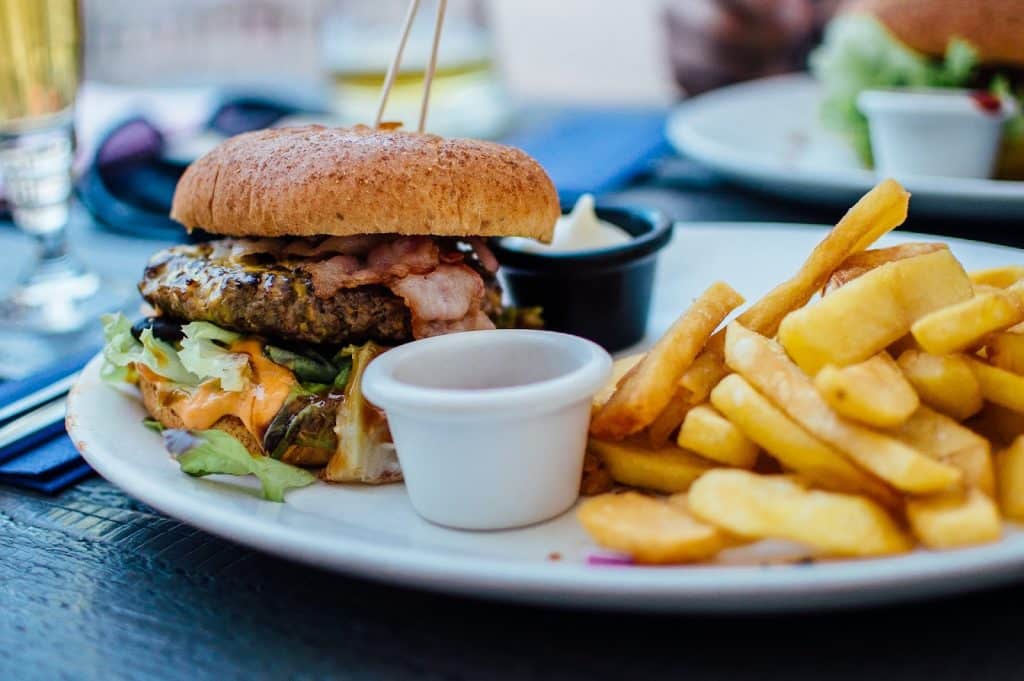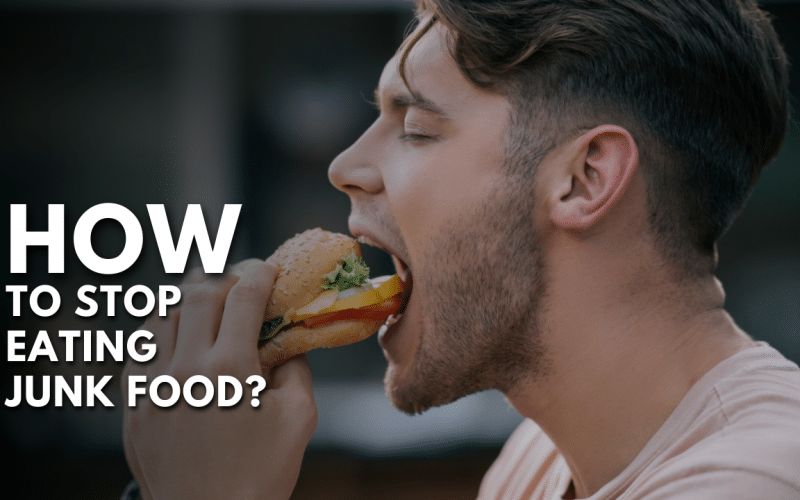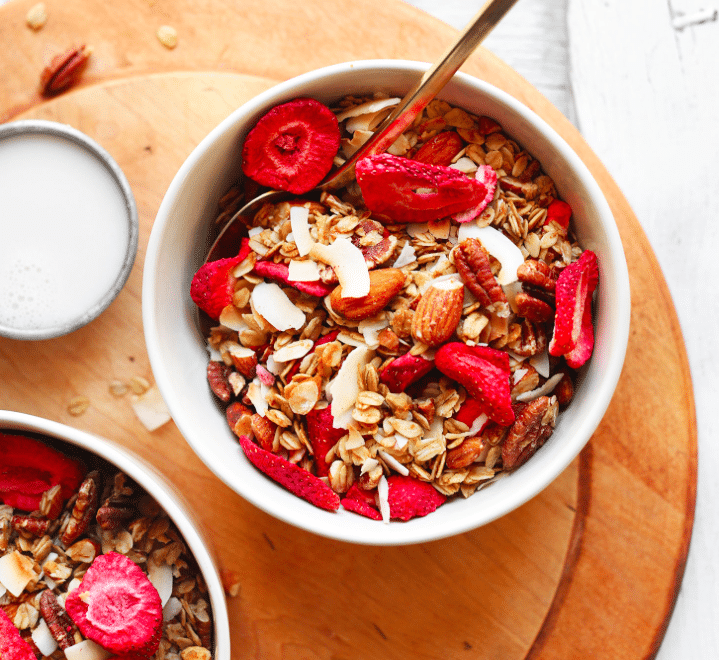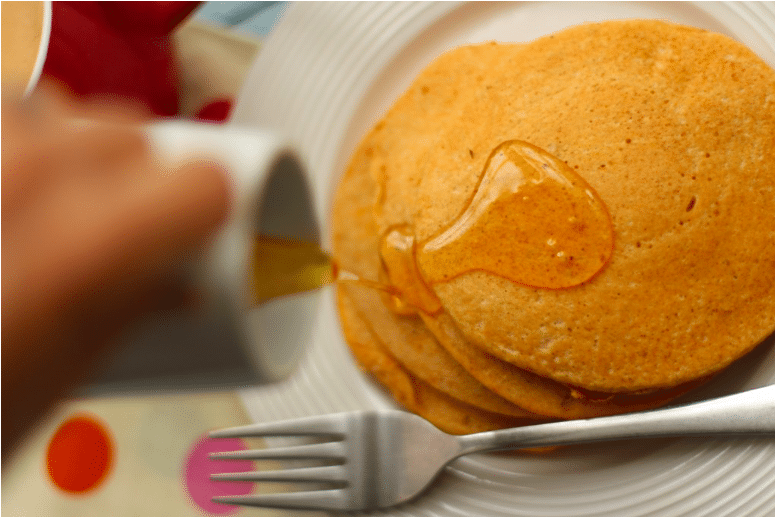Burgers, pizzas, fries, potato chips, cookies, candy, and a whole lot of extra pounds on the scale; did that last bit just snap you out of your junk food craving?
If you find momentary happiness in eating junk food but gasp when you stand on the scale and see you’ve gained a few pounds, it’s probably the best time to switch to healthy eating.
If you’re wondering, ‘How to stop eating junk food,’ keep reading to learn the 12 best ways!
Why Is Junk Food So Irresistible?
From deciding to eat just a handful of potato chips to finishing the large pack, you never realize when you went overboard till your hand digs into the empty pack!
Why do we find junk food so irresistible and difficult to break away from? After all, this is food loaded with sodium, sugar, preservatives, and trans fat (unhealthy fat) and dense with empty calories and low nutrition.
The food manufacturers have managed to develop the ‘bliss point’ of foods that gets you excited every time you eat, see, or even think about them.
When you eat junk food, dopamine levels increase in your brain, making it feel so rewarding and having you desire more.
Junk foods are engineered to the perfect measures of salt, sugar, fat, artificial sweeteners, and flavors to tingle your tastebuds and override your brain’s natural satiety signal.

12 Tips To Break Those Junk Food Cravings
Now that you understand why you crave unhealthy food, read into these tips that will help you break those cravings.
1. Stop Buying Junk Food
To stop your junk food habit, you must avoid keeping these unhealthy foods around you (car, home, and office) in the first place. When you have such food around, you will want to eat more of it.
This calls for mindful shopping. Firstly, never shop hungry; you’re more likely to fall for the tempting, high-calorie processed food choices like salted snacks, candy, and sweets.
Also, it helps to have a list of healthy foods ready before grocery shopping.
Make a list with sections like meat and fish, nuts and seeds, dairy, cereals and pulses, and fruits and vegetables. Try to shop the perimeter of the grocery store since that’s where you’ll find the most healthy food.
Finally, always check the food labels (especially the fine print); if an item has more than five ingredients (or ones you can’t pronounce), it’s best to place it back on the shelf. Look for more whole foods than ultra-processed foods when grocery shopping.
2. Mindful Eating
Whether you’re eating a single raisin or a complete meal, try mindful eating. Avoid gobbling down your food, as doing so won’t give your body the time to register that you have a full stomach.
Always relax and eat your meals or snacks slowly. Focus on the aroma, texture, and taste of your food and the sensations you feel. With mindful eating, you can stay in tune with your internal hunger signals and avoid overeating.
This promotes self-awareness about your body, learning to trust your hunger signals, and understanding when you feel satisfied.
3. Make a Healthy Meal Plan
Make it a practice to plan your meals and snacks for the upcoming week. This will help manage your cravings in more ways than one.
First, you can create a healthy meal plan that you’ll enjoy cooking and eating. You don’t have to rack your brain to come up with a last-minute idea for a meal. You can opt for one of the many diets: vegan, keto, paleo, flexitarian, whole foods, etc.
Also, with a meal plan, you’ll know what grocery to get rather than wandering aimlessly at the store and picking ice cream, doughnuts, and frozen pizza simply because you couldn’t think of anything else to get.
If you find it difficult to do this yourself, consult a nutritionist, health coach, or registered dietitian. You’ll be better informed about your choices and have a tailored meal plan to suit your nutritional requirements.
4. Get Enough Sleep
Sleep is an often underestimated factor that links to unhealthy habits. Those who lack proper, quality sleep feel hunger pangs and develop unhealthy eating habits, causing weight gain.

Some other effects of insufficient sleep include increased anxiety and irritability, type-2 diabetes, hypertension, neurological disorders, and mood disorders.
The recommended eight hours of quality sleep will keep your body and mind well-rested. Things to avoid before going to bed at night:
- Reduce blue light exposure (smartphone, TV, computer) about two hours before bedtime.
- Avoid caffeine or alcohol consumption.
- Avoid eating a couple of hours before bedtime.
5. Healthy Eating
Healthy and balanced meals are rich in protein, fiber, and healthy fats. These digest slowly in your digestive tract and keep you feeling full for longer.
Rather than reaching out for foods with added sugar, grab the healthier choice – a fruit; fruits are loaded with natural sugar, vitamins, antioxidants, water, and fiber.
Healthy Fats
Not all fat is bad for you. The healthy fats are good and keep you full for longer. Try avoiding trans fat and limiting saturated fat.
The good fats come in foods like nuts and oilseeds, avocado, canola oil, olive oil, almond butter, and peanut butter.
Eat Enough Protein
Incorporate sufficient protein in your daily diet and reduce carbohydrates. By consuming more proteins, you’re bound to consume lesser calories each day, making it easier for weight loss.
Whole foods are a better source of protein than processed food.
Eating a protein-rich and nutrient-dense breakfast will keep you satiated for longer. You can choose from plant or animal-based protein based on your diet preferences.
Nuts, oilseeds, pulses, legumes, milk and milk products, beans, fish, and meat are excellent protein sources. These items can help reduce your junk food cravings and aid your metabolism.
Fiber-Rich Food
Eating a good amount of fiber in the form of fruits, vegetables, beans, whole grains, legumes, nuts, seeds, and dried fruits helps maintain good digestive health and keeps those cravings at bay.
6. Track Your Food Intake
It’s easier to analyze what’s going wrong when you track everything you eat, any time of the day. Consider keeping a food journal or using one of the many fitness apps to track your intake.
Apart from logging what food you’re eating and the timings of each meal, note down how you feel. Did you give in to some craving because you were bored or actually hungry? Or were there any other emotions that made the cravings strike?
With this system, you’ll be able to assess the patterns and make the required changes in your lifestyle.
7. Make Simple Swaps
Trying to stop eating junk food all at once can feel pretty overwhelming. It always takes time to get rid of unhealthy habits. After all, the food giants have done a great job of making these foods as addictive as alcohol or drugs.
It’s best to take baby steps and make one swap at a time. Commit to goals that are attainable within a reasonable time. Prioritize to stop eating out of boredom and portion your snacks.
Instead of getting junk food from the grocery store, keep healthy snacks at home, like fresh fruits, granola bars, nuts, and low-fat yogurt; every time you have food cravings, get yourself one of these healthy snacks.
Eating the same food can have you feel bored and look for other unhealthy alternatives. Variety is key to helping yourself feel satisfied.
If the food manufacturers have incorporated this into making processed food, you can do it for healthy foods too.
Try carrot, celery, or cucumber sticks dipped in hummus or peanut butter for variety in snacks. Roast or stir-fry vegetables and season them with different herbs to make for an enjoyable snack.
8. Drink Plenty of Water
The next time you’re craving junk food, drink a glass of water and wait it out. As essential as water is to keep you hydrated throughout the day, it also helps you feel full and balance your blood sugar.

Keep a bottle of water next to you and gulp down some every time the urge to eat junk food kicks in. You’re unlikely to reach for a soda can or any other sugar-loaded unhealthy soft drinks when you drink plenty of water.
The recommended water intake is eight glasses or two liters per day.
9. Sharpen Your Cooking Skills
Rather than opting for fast food as a meal, cooking your food at home will save you money and make it easier to switch to a healthy diet.
When you prepare your meals, you can control how much sugar, salt, and oil you add to your food. You can also make large batches of easy-to-prepare foods like cold salads, beans, and brown rice to pack in serving sizes and grab on your way out to work.
Get an easy-to-follow cookbook for healthy cooking or search for healthy, appetizing recipes on the Internet if you’d like to cook a particular food.
You don’t need to be a professional chef to make a nutritious meal; if you’re new to cooking, start with the easier, basic recipes.
When you can satisfy your hunger with a delicious and healthy home-cooked meal, you’re highly unlikely to look at packaged or processed food.
10. Distract Yourself When You Crave Junk Food
Every time you desire junk food, make it a practice to distract yourself with any other non-food-related activity.
Play with your pet, go for a walk, ring up your friend, or engage in some creative work, household chores, or reorganizing around the home.
The first ten minutes of your junk food craving are the most crucial. The cravings will go away if you can pass through them without giving in to your desire.
11. Work on Stress Management
Stress eating or emotional eating is one of the main reasons you can’t lose weight. It’s human tendency to turn to a candy bar, cake, ice cream, or a bag of potato chips when stressed out, anxious, or overwhelmed with emotions.
With stress, the serotonin levels in your brain decrease, that in turn, increases hunger pangs and causes stress eating or emotional eating behavior.
Once you realize you’re stress-eating, consider working on it. Don’t refrain from talking to a doctor or mental health professional to help you cope.
Here are some effective ways to cope with stress:

- Deep breathing exercises
- Meditation
- Yoga
- Take a walk, run, or do some physical exercise.
- Journal your feelings and thoughts.
- Talk to a family member or trusted friend.
- Engage in some creative activities like painting or playing a musical instrument.
12. Have a Designated Cheat Day
There’s no need to go cold turkey and avoid junk food all at once. You can switch to healthy habits while reducing cravings; avoiding unhealthy food will eventually become second nature.
Let’s face it; there will be occasions when you might want to indulge, like a birthday party or a wedding. Designate one day each week as a cheat day to eat some of your favorite foods, but don’t go overboard.
Are You Ready To Take the Leap Away From Junk?
There’s no better time than now to break the vicious cycle of unhealthy eating, where you keep eating junk food and end up craving more of it.
Don’t beat yourself up if you struggle the first few days to manage your cravings; it’s a slow process. You’ll have to reduce your junk food intake by substituting it with healthy, real foods. With the help of the above tips, you’ll start avoiding junk foods naturally.






